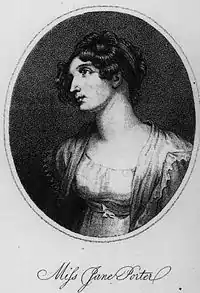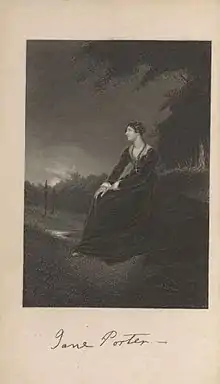Jane Porter
Jane Porter (17 January 1776 – 24 May 1850) was an English historical novelist, dramatist and literary figure.[1][2][3] Her work The Scottish Chiefs is seen as one of the earliest historical novels and remains popular among children in Scotland.
Jane Porter | |
|---|---|
 Jane Porter, from The Ladies' Monthly Museum | |
| Born | 17 January 1776 Durham, England, UK |
| Died | 24 May 1850 (aged 74) Bristol, England, UK |
| Occupation | Novelist |
| Nationality | Scottish |
| Citizenship | Kingdom of Great Britain |
| Period | 1803–1840 |
| Genre | Historical fiction |
| Subject | Historical documentary |
| Notable works | The Scottish Chiefs |
Life
Jane Porter was born in Durham, England, the third of the five children of William Porter and Jane (née Blenkinsop). Tall and beautiful as she grew up, Jane Porter's grave air earned her the nickname La Penserosa ("the pensive girl"). After her father's death, her family moved to Edinburgh, where Sir Walter Scott was a regular visitor. Some time afterwards the family moved to London, where the sisters became acquainted with a number of literary women: Elizabeth Inchbald, Anna Laetitia Barbauld, Hannah More, Elizabeth Hamilton, Selina Davenport, Elizabeth Benger and Mrs Champion de Crespigny.
Porter's siblings also achieved some fame in their lifetimes; her sister Anna Maria Porter was also a novelist; her brother Sir Robert Ker Porter was a noted painter.[4]
Works
Porter is considered to have "crafted and pioneered many of the narrative tools most commonly associated with both the national tale and the historical novel,"[5] though her claims during her lifetime to have done so were often ridiculed and dismissed.[6] Her 1810 work The Scottish Chiefs, about William Wallace, one of the earliest examples of the historical novel,[7] was very successful and the French version was banned by Napoleon. It has remained popular with Scottish children. The Pastor's Fireside (1817) was a story, set in the 18th century, about the later members of the House of Stuart.[8] Despite being one of the most popular writers of her time, the profligacy and poor financial decisions of her brothers kept her very poor, as she and sister Anna Maria were constantly obliged to use their incomes to pay off their brothers' debts.[6]

Porter also wrote Thaddeus of Warsaw, set in the late 18th century Polish–Lithuanian Commonwealth. Despite the work's success, Porter did not benefit financially, as its copyright was held by its various publishers. To gain some income from it, she resorted to ostensibly new editions that were published with prefaces and minor changes.[9] She applied unsuccessfully to the government for a literary pension, and being personally "totally destitute or nearly so", was obliged to move between the domiciles of her friends.[10]
Porter contributed to periodicals and wrote the play Switzerland (1819), which seems to have been deliberately sabotaged by its lead Edmund Kean and closed after its first performance.[11] She is sometimes associated with the 1822 production Owen, Prince of Powys, which closed after only three performances,[8] but this was actually the work of Samson Penley.[11] Porter also wrote Tales Round a Winter Hearth (1821), Coming Out (1828) and The Field of Forty Footsteps (1828) with her sister, Anna Maria.[1]
A romance, Sir Edward Seaward's Diary (1831), purporting to be a record of actual circumstances and edited by Jane, was written by her brother, Dr William Ogilvie Porter, as letters in the University of Durham Porter archives show.
In her later years, Porter continued to write shorter pieces for journals. Many were published anonymously or simply signed "J. P." Her wide-ranging topics included Peter the Great, Simón Bolívar, and the African explorer Dixon Denham.[12]
Influences
Porter, like many of her contemporaries, was fascinated by Lord Byron. The villain in The Pastor's Fireside, Duke Wharton, has been said to cast "an unmistakably Byronic shadow."[13] Additional influences on Porter's writing include her schoolmaster George Fulton, Edmund Spenser's The Faerie Queene and Sir Philip Sidney's Arcadia.[4][14]
References
- McCalman, Iain, ed. (2009). "Porter, Jane". An Oxford Companion to the Romantic Age. Oxford University Press.
- Lee, Elizabet (1896). "Porter, Jane". In Lee, Sidney (ed.). Dictionary of National Biography. 46. London: Smith, Elder & Co. pp. 182–184.
- Todd, Janet, ed. (1989). "Porter, Jane". British Women Writers: a critical reference guide. Routledge. pp. 542–543.
- Sutherland, Virginia (2013). "Jane Porter and the Heroic Past". In Otago Students of Letters (ed.). In Her Hand: Letters of Romantic-Era British Women Writers in New Zealand Collections. Dunedin: University of Otago.
- McLean, Thomas (2007). "Nobody's Argument: Jane Porter and the Historical Novel". Journal for Early Modern Cultural Studies. 7 (2): 88–103. doi:10.2979/JEM.2007.7.2.88.
- What'sHerName and Dr. Devoney Looser (2 April 2018). "THE SISTERS: Jane and Anna Maria Porter". What'shername. Retrieved 7 January 2019.
- "Historical novel", The Oxford Companion to English Literature, ed. Margaret Drabble. OUP, 1995, p. 470.
- Birch, Dinah, ed. (2011). The Oxford Companion to English Literature. Oxford University Press.
- Looser, Devoney (2010). Women Writers and Old Age in Great Britain, 1750–1850. JHU Press. p. 157. ISBN 978-1-4214-0022-8.
- Looser, Devoney (2010). Women Writers and Old Age in Great Britain, 1750–1850. JHU Press. p. 159. ISBN 978-1-4214-0022-8.
- McMillan, Dorothy (1885–1900). . Dictionary of National Biography. London: Smith, Elder & Co.
- McLean, Thomas (2009). "Jane Porter's Later Works, 1825-1846". Harvard Library Bulletin. 20 (2): 45–62.
- McLean, Thomas (2012). "Jane Porter and the Wonder of Lord Byron". Romanticism. 18 (3): 250–59. doi:10.3366/rom.2012.0096.
- Kelly, Gary, ed. (2002). Varieties of Female Gothic. 1. London: Pickering & Chatto.
External links
| Library resources about Jane Porter |
| By Jane Porter |
|---|
- Works by Jane Porter at Project Gutenberg
- Works by or about Jane Porter at Internet Archive
- Works by Jane Porter at LibriVox (public domain audiobooks)

- "Archival material relating to Jane Porter". UK National Archives.

- Porter Family Collection at the Kenneth Spencer Research Library at the University of Kansas
- Episode on Jane and Anna Maria Porte r, with biographer Devoney Looser, at What'sHerName Podcast
